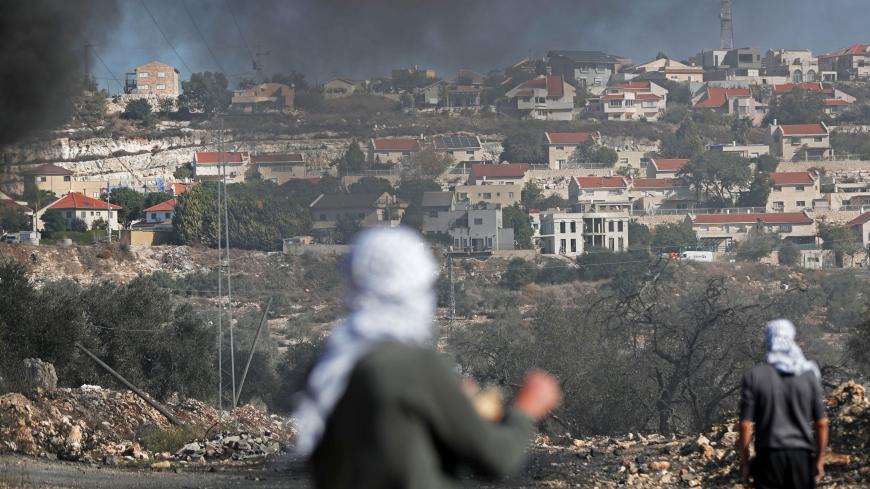RAMALLAH, West Bank — US Secretary of State Mike Pompeo announced Nov. 18 that the United States no longer considers Israeli settlements in the West Bank to be “inconsistent with international law.” The Palestinian Authority saw the statement as US bias toward Israel and a green light for Israel to annex areas of the West Bank.
The Palestinian leadership, including President Mahmoud Abbas, the Executive Committee of the Palestine Liberation Organization, Fatah’s Central Committee and the secretaries of the Palestinian factions, held an emergency meeting in Ramallah on Nov. 19 and developed a plan of action to confront the US position.
According to the Palestinian leadership's statement, the plan has two tracks. The first is a political and diplomatic effort to rally international and Arab support from the UN Security Council, the UN General Assembly, the Arab League and the Islamic Action Organization against the US position, in addition to joining important international bodies such as the World Intellectual Property Organization. The second track is domestic action such as expanding popular resistance against settlements, urging Palestinians to participate in demonstrations across the West Bank and tightening the 2010 prohibition on settlement products that criminalized any Palestinian dealings with settlements.
The government held an emergency session on Nov. 20. In a statement, the PA stressed, “The decision of the US administration irrevocably abolishes any role it can have in any current or future political track. The government stands behind the president's leadership and decisions in all political, legal, economic and popular measures he deems necessary.”
On Nov. 20, the Palestinian Youth Movement, the student arm of Fatah in the West Bank and Gaza, decided to “prohibit the activities of the US administration and prevent any representative of the US administration from entering Palestine.”
Minister of Social Affairs and member of the PLO’s Executive Committee Ahmed Majdalani told Al-Monitor that by recognizing the settlements, the United States has become a partner in the occupation.
“The US administration’s decision came to support Benjamin Netanyahu, whose position is worsening at home in light of the corruption accusations he is facing, and help him to mobilize support from the right wing in the upcoming elections, following the failure to form an Israeli government,” he said. “The US decision is a green light for Netanyahu to annex the Jordan Valley.”
The Israeli newspaper Maariv reported Nov. 19 that Netanyahu had ordered a law be drafted to impose Israeli sovereignty over the Jordan Valley and the Dead Sea, to be submitted to the Knesset within the next few days. On Dec. 2, the Likud announced Netanyahu is seeking the premiership in a coalition government for six months only to complete the annexation of the Jordan Valley, after which he will step aside.
Majdalani added, “The world rejects and condemns the US decision. During the Security Council session on Nov. 20, 14 countries rejected the decision.”
Majdalani revealed that the PA is in contact with various international parties to arrange a special session of the Security Council via Kuwait. He said that in the event that a Security Council resolution against the settlements fails to pass, the PA will head to the UN General Assembly under the “Uniting for Peace” resolution.
Security Council Resolution 377, “Uniting for Peace,” obligates the UN General Assembly to hold a special emergency session within 24 hours if the five permanent members of the Security Council fail to achieve consensus on issues threatening international peace and security. The recommendations issued by the General Assembly are mandatory.
However, part of the Palestinian leadership believes that the Palestinian response to the US administration should be stronger. The deputy secretary general of the Democratic Front for the Liberation of Palestine, Qais Abd al-Karim, told Al-Monitor, “The American threat has become existential to the cause and must be confronted with massive public action that could amount to an intifada. We could also take political steps such as joining international agencies, stopping security coordination with the CIA and reviewing all relations and agreements with Israel, including stopping security coordination.”
Speaking about the PA’s ability to implement such decisions, Abd al-Karim noted, “We have previously demanded such action and pressure is currently being exerted on the PA leadership to stop hesitating once and for all and start taking action.” He pointed out, “The hesitation in not implementing these decisions stems from the fear of a comprehensive and costly confrontation with the US and Israel.”
Abd al-Karim went on, “If the leadership makes concrete and bold decisions, it will motivate the masses once they sense that the battle could be serious and decisive.”
Nabil Amr, Fatah leader and member of the PLO’s Central Council, told Al-Monitor, “The best response to the US position would be to address the internal Palestinian affairs and carry out reforms. Such actions include strengthening the Palestinians’ presence on their land and their struggle, reforming the PA to become efficient by improving its performance and holding Palestinian elections, which would garner more international support for us.”
Amr noted, “The Palestinians have no choice but to raise this issue with the international community and this is what will happen.” He added, “We must take advantage of the international positions rejecting the US decision and completely isolate it from the international position, which we should preserve, as it considers settlements illegal.”
He pointed out, “The sole decision-makers in this regard are the Palestinians, and they have decided that every stone in any settlement is illegal and unacceptable.”
Amr described the PA's ability to mobilize the public as “modest,” adding, “The situation does not require asking people to take to the streets and engage with the occupation, but to rebuild institutions and to restore the weak relationship and trust between the PA and the people. The public can then play an important role in confronting Israel.”







